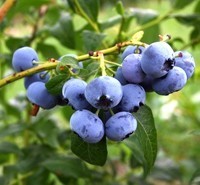 There are a lot of health reasons we should expand the “apple a day” adage, such as for cancer prevention. A large study published last week now suggests that adding pears, blueberries and other fruits to your diet may also lower your risk of type 2 diabetes.
There are a lot of health reasons we should expand the “apple a day” adage, such as for cancer prevention. A large study published last week now suggests that adding pears, blueberries and other fruits to your diet may also lower your risk of type 2 diabetes.
This study published in the American Journal of Clinical Nutrition looked at whether plant substances called dietary flavonoids link to risk of type 2 diabetes in adults. Their data came from 3 large U.S. studies, which together total about 200,000 participants followed for at least 2 decades..
Researchers looked at participants’ food questionnaires, completed every four years to determine how much of these different flavonoids they consumed. They found that the type called anthocyanins were associated with a lower risk of type 2 diabetes.
They also found that the anthocyanin-rich foods mostly consumed by the participants – blueberries, strawberries and apples or pears – were linked to reduced diabetes risk. Those who ate at least 5 servings of apples or pears per week had a 23% lower risk than those who ate these fruits less than 1 time per month. Eating blueberries at least 2 times per week lowered risk by 23% compared to those eating them less than 1 time per month.
One in ten Americans currently has type 2 diabetes and the U.S. Centers for Disease Control and Prevention project that by 2050, 1 in 3 will have diabetes if current trends continue. That may also lead to more cancer because evidence is also strong that type 2 diabetes increases risk for several cancers.
We know that overweight and obesity and lack of physical activity are important risk factors for type 2 diabetes, but we have much more to learn about how specific foods can affect risk.
Fruit consumption is often a question for those with diabetes because of the natural sugar content. If you have type 2 diabetes, work with your health care provider to determine how fruit fits into your diet. For those who do not have diabetes, the good news is that including these fruits in your diet appears to be protective.
Fruit also protects against cancer. AICR’s expert report found that fruits lower risk for oral, esophageal, lung and stomach cancers.
Apples and pears are affordable and available year round; blueberries are available fresh in the summer months and frozen year round. For more information on these fruits, tips and recipes check out apples and blueberries in AICR’s Foods that Fight Cancer section.
What’s your favorite way to include apples, pears or blueberries in your diet?






I’m a great believer in blueberries being the wonder fruit. And they just taste so good.
I’m a great believer in blueberries being the wonder fruit. And they just taste so good.